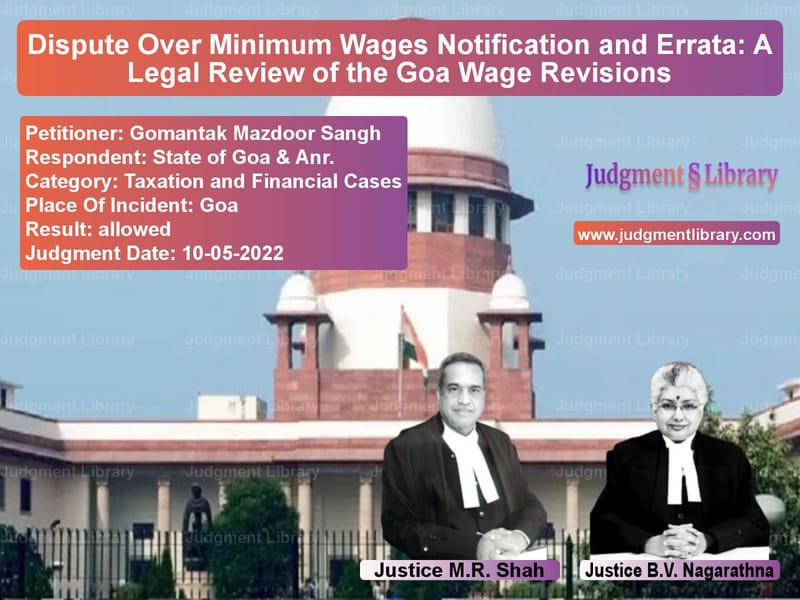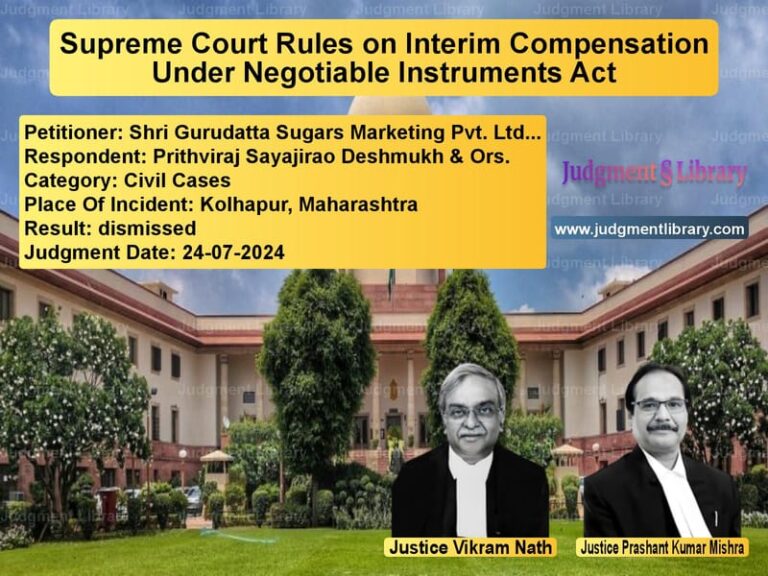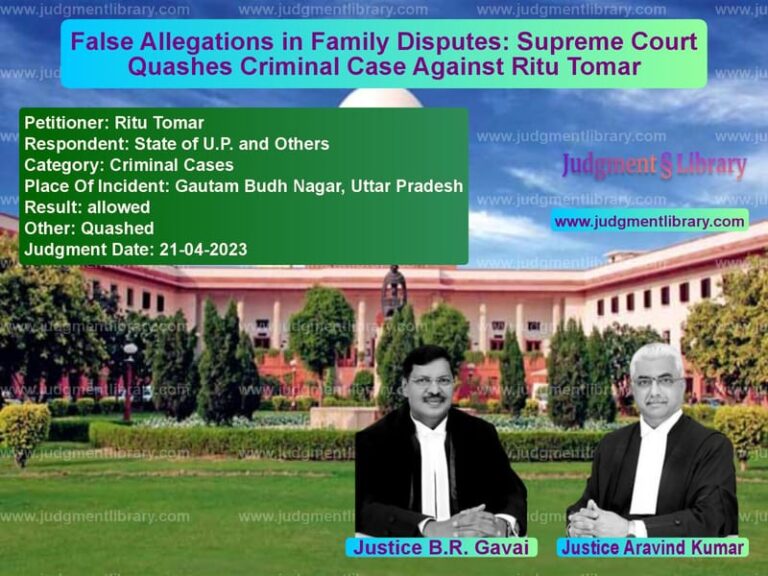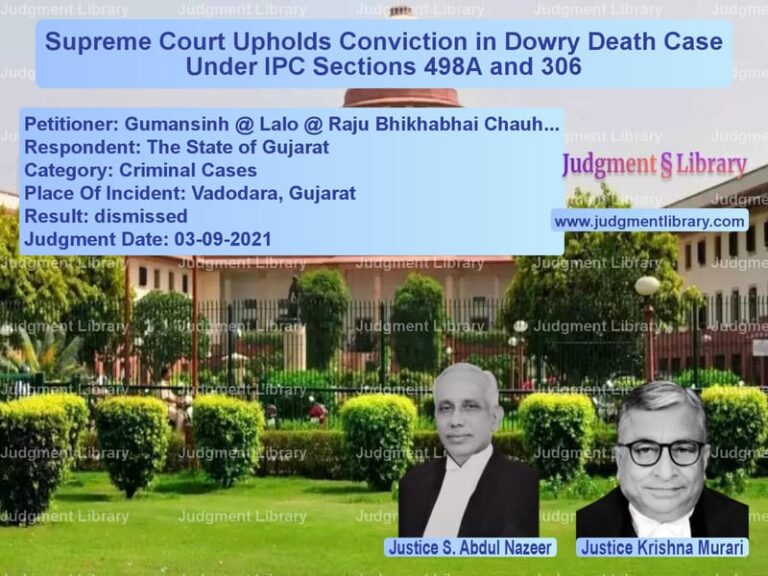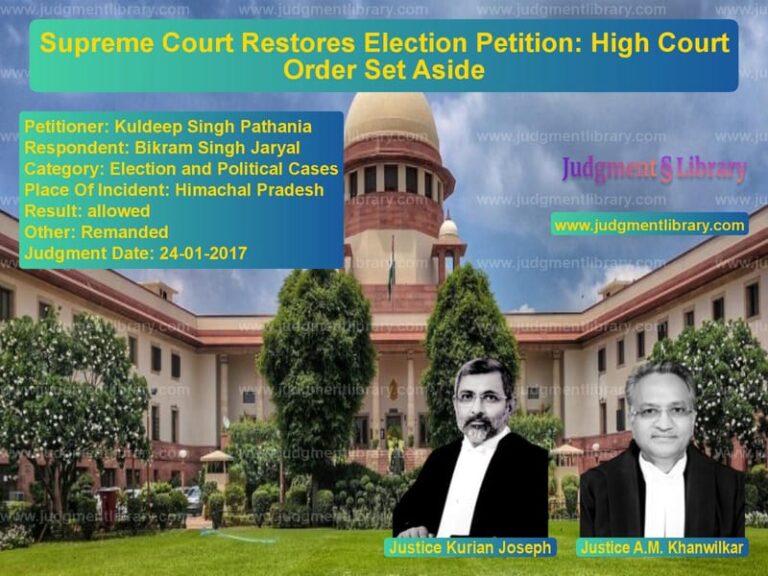Dispute Over Minimum Wages Notification and Errata: A Legal Review of the Goa Wage Revisions
This case concerns the challenge to the Errata Notification issued by the State of Goa, which modified its previous notification regarding minimum wage rates for workers. The appellant, Gomantak Mazdoor Sangh, contested the validity of the Errata Notification dated 14th July 2016, which amended the original notification issued on 23/24th May 2016. The appellant argued that the Errata Notification made a substantial change in the nature of the minimum wage rates, removing the special allowance and fixing the wages as an all-inclusive rate. The State of Goa defended the Errata Notification, asserting that it was merely a clerical correction of a mistake made in the earlier notification.
Petitioner’s Arguments
The appellant, represented by counsel Mr. Mayank Pandey, strongly opposed the Errata Notification, claiming that it was not a mere clerical mistake but a significant alteration of the original notification. The original notification, which determined the minimum wage rates, included both basic wages and a special allowance (variable dearness allowance), as provided for in Section 4(1)(i) of the Minimum Wages Act, 1948. The appellant contended that the changes introduced in the Errata Notification, which replaced the special allowance with an all-inclusive rate, were not merely clerical errors and therefore should have followed the same procedure as the original notification, including consultation with the Minimum Wages Advisory Board.
The appellant argued that the State had consciously made the decision to introduce a special allowance, and this decision should not be altered unilaterally through an Errata Notification without going through the proper procedure. They further relied on Section 21 of the General Clauses Act, which outlines the procedure for amending or rescinding notifications, and argued that the Errata Notification did not comply with the procedural requirements.
Respondent’s Arguments
The respondent, represented by counsel Mr. Abhay Anil Anturkar, defended the Errata Notification, asserting that it was issued to correct a clerical mistake in the original notification. According to the respondent, the initial notification dated 23/24th May 2016 had inadvertently referred to clause (i) of Section 4(1) instead of clause (iii), which had led to an incorrect formulation of the wage structure. The respondent argued that the amendment was necessary to ensure the correct application of the provisions of the Minimum Wages Act and that the State was within its rights to issue the Errata Notification under Section 10 of the Act, which allows for the correction of clerical or arithmetical errors in any order regarding minimum wages.
The respondent further argued that the Errata Notification was issued in good faith to correct a typographical error and that the revised wages were consistent with the provisions of the Act. They emphasized that the decision to issue the Errata Notification was made with the appropriate approval and that the process followed was in line with the requirements of the Minimum Wages Act.
Court’s Analysis and Conclusion
The Supreme Court reviewed the legal arguments presented by both parties and examined the provisions of the Minimum Wages Act, 1948, particularly Sections 4 and 5, which outline the procedure for fixing and revising minimum wage rates. The Court also considered the applicability of Section 10 of the Act, which allows for the correction of clerical or arithmetical mistakes in any order fixing or revising the minimum wage rates.
The Court observed that the original notification issued by the State Government was a conscious decision to fix the minimum wage rates, including both basic wages and a special allowance. The Court noted that the notification had been issued after due consultation with the Minimum Wage Advisory Board and after considering objections from various stakeholders, including labor unions. The Court found that the State’s argument that the original notification contained a clerical error was unconvincing, as the notification had been issued with full awareness of its contents and after proper deliberation.
Further, the Court analyzed Section 10 of the Minimum Wages Act, which permits the correction of clerical or arithmetical mistakes in notifications related to minimum wages. The Court concluded that the changes made by the Errata Notification were not of a clerical or arithmetical nature but were substantive changes to the wage structure. The Court held that such changes should have followed the full procedure outlined in Section 5 of the Act, which requires consultation with the Advisory Board and the publication of proposals for the revision of minimum wages.
Final Decision
In light of the above, the Supreme Court held that the Errata Notification issued by the State of Goa was unlawful and beyond the powers granted under Section 10 of the Minimum Wages Act. The Court quashed the Errata Notification and restored the original notification issued on 23/24th May 2016, which included the special allowance as part of the minimum wages. The Court emphasized that any substantial changes to the wage structure must follow the proper legal procedure, including consultation with the Minimum Wage Advisory Board. The appeal was allowed, and the impugned judgment of the High Court dismissing the writ petition was set aside.
Petitioner Name: Gomantak Mazdoor Sangh.Respondent Name: State of Goa & Anr..Judgment By: Justice M.R. Shah, Justice B.V. Nagarathna.Place Of Incident: Goa.Judgment Date: 10-05-2022.
Don’t miss out on the full details! Download the complete judgment in PDF format below and gain valuable insights instantly!
Download Judgment: gomantak-mazdoor-san-vs-state-of-goa-&-anr.-supreme-court-of-india-judgment-dated-10-05-2022.pdf
Directly Download Judgment: Directly download this Judgment
See all petitions in Income Tax Disputes
See all petitions in Tax Evasion Cases
See all petitions in Tax Refund Disputes
See all petitions in Judgment by Mukeshkumar Rasikbhai Shah
See all petitions in Judgment by B.V. Nagarathna
See all petitions in allowed
See all petitions in supreme court of India judgments May 2022
See all petitions in 2022 judgments
See all posts in Taxation and Financial Cases Category
See all allowed petitions in Taxation and Financial Cases Category
See all Dismissed petitions in Taxation and Financial Cases Category
See all partially allowed petitions in Taxation and Financial Cases Category

